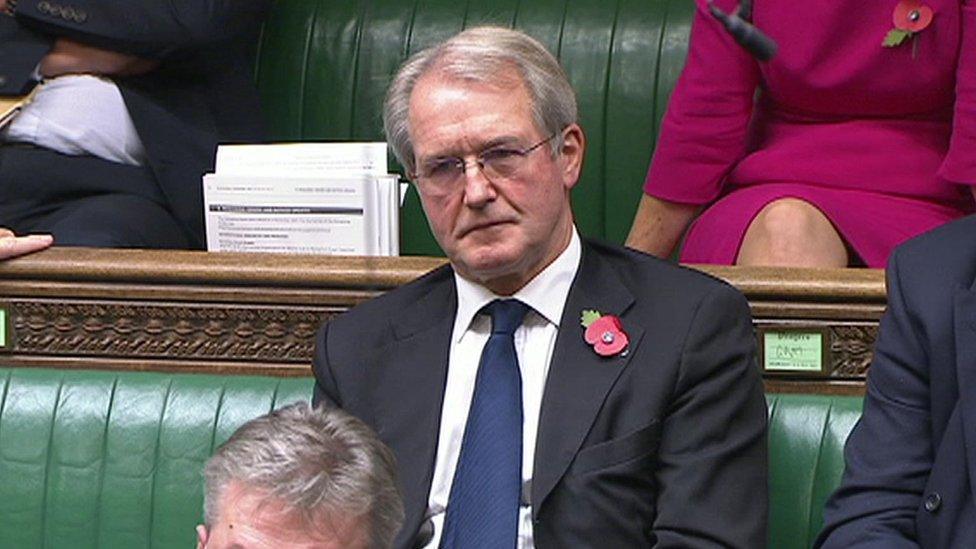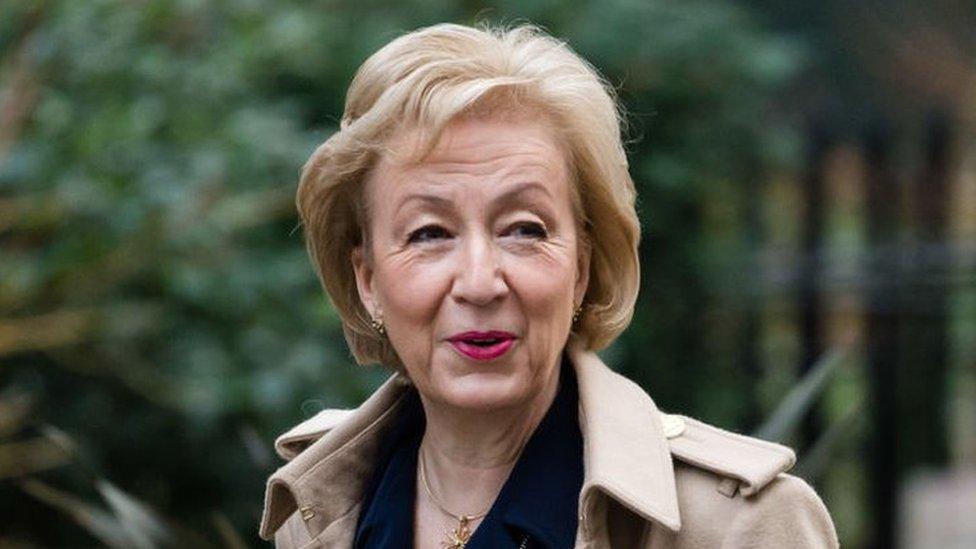Owen Paterson: Anger as Tory MP avoids suspension in rule shake-up
- Published
Tellers announce the votes to change the rules which are backed by a majority of MPs, while "shame" is shouted from the benches.
Conservative Owen Paterson has avoided punishment for now as the government ordered its MPs to back a review of standards investigations.
The result of the vote was met with cries of "shame" from opposition MPs.
Mr Paterson was found to have misused his position as an MP to benefit two companies he worked for.
But he said the probe into his conduct had been unfair - and the government backed plans by his allies to overhaul the system.
Labour, the SNP and Lib Dems voted against the plans, along with 13 Conservative MPs, but it was carried by 18 votes after a heated Commons debate.
In a statement after the vote, Mr Paterson said: "After two years of hell, I now have the opportunity to clear my name."
In an interview with the BBC, he thanked the MPs who voted for the overhaul, acknowledging they had "taken a political hit".
"But we will at last now be able to create a proper system, based on the rules of natural justice," he added.
Labour's deputy leader Angela Rayner accused the Conservatives of being "rotten to the core" and called the move an "absolute disgrace".
She said Labour would "not be taking any part in this sham process or any corrupt committee", with the SNP and Lib Dems also saying they would boycott the overhaul.
The controversy comes after a committee of MPs recommended Mr Paterson be suspended from the Commons for 30 days, following a damning report into his conduct by the Parliamentary Standards Commissioner Kathryn Stone.
The report, external said the former Northern Ireland secretary had breached Commons rules by lobbying government bodies about Randox and Lynn's Country Foods, which employed him as a paid consultant.
After the vote not to uphold the committee's recommendation, the BBC understands Ms Stone will not be resigning as standards commissioner.
The government did not order its MPs to uphold the proposed suspension, which could have led to Mr Paterson facing a by-election in his North Shropshire constituency.
Instead, they were told to back an amendment drawn up by Tory former cabinet minister Andrea Leadsom to pause his suspension and set up a new Tory-majority committee to look at how investigations are carried out.

Owen Paterson watched on in the Commons as MPs debated whether to suspend him
At Prime Minister's Questions, Boris Johnson said MPs found to have broken the rules should get a right of appeal, as would happen with doctors and teachers found guilty of misconduct.
But the SNP's Pete Wishart accused the government of "attempting to turn back the clock to the worst examples of 1990s Tory sleaze".
Ahead of the vote, the committee's Labour chairman Chris Bryant told MPs Mr Paterson had lobbied ministers "time and again, in a way that conferred a direct benefit on his paying clients".
"That is expressly forbidden. It is a corrupt practice," he added.
He said Mr Paterson had been given "every opportunity" to put his case across - and his arguments had been heard "respectfully and fairly".


Every MP who backed today's move can expect to have it used against them on political leaflets or Facebook campaigns.
There could be serious consequences in Parliament if the opposition parties decide to use this moment to withdraw cooperation on other committees or ways of working.
Some ministers already fear this is an episode that Downing Street may come to regret.
Owen Paterson is adamant that he did nothing wrong, and has been denied natural justice.
But with this Tory response, voters may well come to wonder, what's fair about this?

The Commons standards committee found that Mr Paterson had used his parliamentary office on 16 occasions for meetings relating to his outside business interests and sent two letters relating to business interests on House of Commons-headed notepaper.
It described the MP's actions as "an egregious case of paid advocacy".
However Mr Paterson denied any wrongdoing, and argued his approaches had been within the rules because he was seeking to alert ministers to defects in safety regulations.
He said the investigation had "a major contributory factor" in the death of his wife, Rose, who took her own life last year.
He claimed he had been pronounced guilty "without being spoken to" and that "no proper investigation was undertaken".

Andrea Leadsom said she had "grave concerns" about the existing system
Thirteen Conservatives voted against Ms Leadsom's amendment, while 98 had no vote recorded - either by a deliberate abstention or because they were not able to vote.
Tory MP Angela Richardson appeared to confirm she was no longer a parliamentary aide to ministers after defying government orders to vote for the amendment and abstaining instead.
As a parliamentary private secretary, she would normally be expected to resign in order to oppose the government.
Writing on Twitter, external, she said: "I abstained on the Leadsom amendment aware that my job was at risk, but it was a matter of principle for me."
Aaron Bell - a Tory who opposed the amendment - said the proposals made it look "like we're moving the goalposts" and that any reform of the rules needed support across the Commons.
Liberal Democrat chief whip Wendy Chamberlain described the amendment as a "stitch-up", adding: "You expect in a tin-pot dictatorship, not the home of parliamentary democracy."